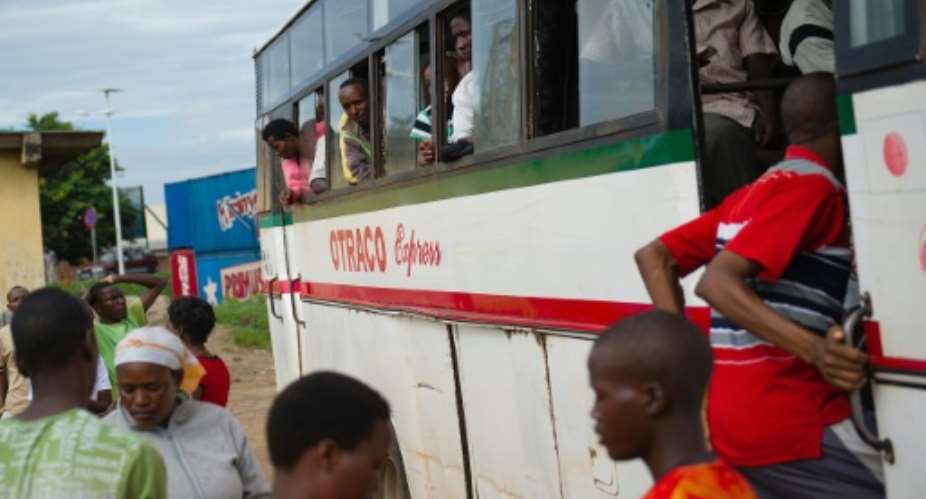Kigali (AFP) - Buses to Burundi from neighbouring Rwanda used to be full, but nowadays they struggle for passengers: a reflection of tensions amid accusations Kigali is backing a rebellion against Bujumbura.
Checkpoints on the roads from Rwanda have sprung up, with passengers regularly taken off buses and accused of being part of a rebel army Bujumbura accuses Rwanda of harbouring on its soil.
"If you are young you are routinely arrested," said Jacques, who works for a Rwandan bus operator.
Burundi, where a 13-year civil war between Tutsis and Hutus ended in 2006, has been rocked by violence since April, when President Pierre Nkurunziza launched his successful but highly controversial bid for a third term in power.
It sparked an attempted coup and months of civil unrest led by opposition groups, who said it was in defiance of the constitution and the Arusha accords which ended the war.
Tightly-controlled Rwanda -- which has a similar ethnic makeup to Burundi -- is seen as a safe place for those who oppose the government in Bujumbura.
- Dissidents flee to Rwanda -
The Rwandan capital Kigali has become a refuge for many opposition and civil society activists -- as well as dissidents from Nkurunziza's ruling party.
Burundi however goes a step further, claiming that rebel forces -- set up by mutinous soldiers after a failed coup in May -- are also there and enjoying Rwandan support.
Relations between Rwanda and Burundi grew tense after Rwanda President Paul Kagame urged Nkurunziza to end his bid for a third term.
The people of Rwanda and Burundi have close ties, and have taken turns sheltering in each other's countries when trouble spiked, including during Rwanda's 1994 genocide and Burundi's 1993-2006 civil war.
But relations between Bujumbura and Kigali are more frosty.
The number of travellers between the capitals -- which are only 300 kilometres (185 miles) apart -- has been cut by almost two-thirds, one Rwandan bus company owner said.
Many Rwandans used to travel regularly to Burundi for business, to study or to visit relatives.
Since the crisis began in Burundi in April, some 200 Rwandans have been arrested in Burundi, a Rwandan diplomat said, adding that while around 50 had been released, they had been no news of the others.
"Rwandans are in the crosshairs of Burundi's security services, they are taken from the bus from Rwanda and imprisoned, just because they are Rwandans," the diplomat said, asking not to be named. "Others were arrested at their workplace."
- 'Severely beaten' -
Alois Bayingana, a 43-year-old Rwandan taxi driver, was arrested in August in a Bujumbura bar after driving a customer to the city from Kigali.
He was taken to Burundi's feared National Intelligence Agency.
"I was severely beaten, they kept saying that I was a rebel sent by Kagame," said Bayingana, who was released after two weeks.
Burundians leaving or returning home are also questioned.
For traders the restrictions are costly.
"I cannot go to Burundi," said a Rwandan businessman who would only gave his name as Stephane, adding he had invested "millions" of dollars in the country.
"I am afraid, my friends in Burundi tell me not to come," he added, saying he feared being accused of financing rebellion.
Rwanda's government has remained tightlipped despite a slew of accusations from Burundi.
Kigali's Minister of Justice Johnston Busingye said Rwanda was seeking to resolve tensions "amicably and diplomatically" between the two "sister republics".
For now, businesses try to survive.
Rwanda and Burundi "accuse each other, but we are merchants, and no one knows exactly why and we do not know what will happen" in the future, Stephane said, fearing a long crisis and saying he was "very worried" for his business.





 Saglemi Housing Project will not be left to rot – Kojo Oppong Nkrumah
Saglemi Housing Project will not be left to rot – Kojo Oppong Nkrumah
 Transport fares hike: GPRTU issue two-day ultimatum
Transport fares hike: GPRTU issue two-day ultimatum
 ARC endorses Alan as presidential candidate – Buaben Asamoa
ARC endorses Alan as presidential candidate – Buaben Asamoa
 Akufo-Addo appoints Kwasi Agyei as new Controller and Accountant-General
Akufo-Addo appoints Kwasi Agyei as new Controller and Accountant-General
 PNC dismiss reports of mass resignations
PNC dismiss reports of mass resignations
 PAC advocates for revenue collectors to be engaged on commission basis, not full...
PAC advocates for revenue collectors to be engaged on commission basis, not full...
 Genser Energy commissions 110km of natural gas pipeline at Anwomaso
Genser Energy commissions 110km of natural gas pipeline at Anwomaso
 Naa Torshie calls for tolerance, peace ahead of 2024 election
Naa Torshie calls for tolerance, peace ahead of 2024 election
 Asantehene commends Matthew Opoku Prempeh for conceiving GENSER Kumasi Pipeline ...
Asantehene commends Matthew Opoku Prempeh for conceiving GENSER Kumasi Pipeline ...
 Let’s do away with ‘slash and burn politics’ in Ghana — Dr Adutwum
Let’s do away with ‘slash and burn politics’ in Ghana — Dr Adutwum
